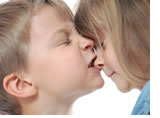
 Little Nippers
Little NippersBiting in child care and what to do about it
One of the most prevalent issues in child care and an issue which still generates some of the most emails to CareforKids.com.au is biting in child care and how to deal with it. And don't worry, if your child has been the victim or the perpetrator of biting in child care, you are definitely not alone.
In fact statistics reckon around one in 10 children bite. The other nine either haven't been caught red-handed or are too busy kicking, pinching, punching, shouting, screaming etc to have time to bite. At the end of the day, these are just things that young children do out of frustration and an inability to communicate effectively in another way.
If you haven't seen it already or even if you have and need a bit of a laugh today, Google the hilarious treatment of Lily's new biting fad on Modern Family, which of course leads to a disagreement between Mitch and Cam over how to deal with it.
Mitchell Googles how to deal with biting and finds a variety of responses including "putting a pinch of pepper in the child's mouth J" Cam: "Oh, so the smiley face makes it ok? Look I just waterboarded our toddler, LOL".
And who can forget Cam's song to Lily, "People aren't food, people aren't food, your friends will run away if they're scared of being chewed…" A YouTube must.
View the Modern Family song or if you can bear to watch Yo Gabba Gabba – here's their song about not biting your friends.
So, while it can obviously be traumatic for all involved, biting is as inevitable a part of life for children in child care centres as coughs, colds and nits and it's nothing to be overly worried or embarrassed and ashamed about…unless of course it carries on to adulthood.
Young children explore their world with their mouth and biting is a natural extension of that process. For children under three years the urge to bite arises from this natural curiosity and it can also be linked to feelings of stress, frustration and excitement as well as hunger!
In a child care, environment biting is an emotional and stressful experience for both the biter and the victim and for the parents of both children, who can feel incensed, upset, worried and guilty, particularly when we're told our child is the biter.
Although it can be a serious problem and certainly inflicts pain and jaw shaped bruises, it's important that we don't over-act to a biting incident - both at home and in child care. A child who bites isn't necessarily trying to inflict pain and suffering on another child, it's just part of a baby's development. Child care centres are generally very practical about these incidents and follow a strict procedure about dealing with biting.
If you are advised that your child has bitten another child, or has been bitten, make sure you work with your child care provider to deal with the issue as quickly and effectively as you can.
Ask to read the centre's policy on biting. Ask about any strategies the centre uses to manage biting and where possible apply these strategies at home so that the issue is managed consistently and dealt with quickly. A good child care centre will usually be very adept at dealing with biting. They will generally alert the parents of both parties and talk to the parent of the biter about the reasons for and how to deal with the issue.
The following are the most common reasons for biting:
- Teething
- Natural curiosity/exploration
- Excitement
- Frustration / communication development
- Attention seeking
- Powerlessness
- Stress
When this does happen remember the following:
- Act calmly, maintain a quiet and controlled voice, remove the biting child from the situation and say very firmly 'No biting! Biting hurts'.
- Take care of the child who has been bitten first, calm the child with cuddles and kind words and clean the bite area.
- Once the victim is feeling better, approach the biter and explain why it was wrong.
- Encourage the biter to say sorry to the victim and comfort them with cuddling and/or gentle strokes.
- If the biter is old enough, ask him/her to suggest what could be done instead of biting and give him/her other ways to deal with a stressful or frustrating situation.
It is important to remember that the vast majority of children will have grown out of the biting phase by the time they go to pre-school or start school. If a child does continue after five years old, the cause should be explored with a GP or child psychologist as it may indicate something more serious.
© 2012 - All rights reserved
Care For Kids Internet Services Pty Ltd
ABN 55 104 145 735
PO Box 543 Balmain NSW 2041
privacy policy contact us